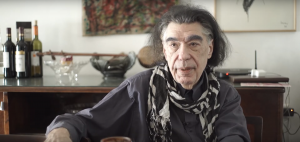Difference between revisions of "Iancu Dumitrescu"
From Unearthing The Music
Diogooutra (talk | contribs) m |
Diogooutra (talk | contribs) m |
||
| Line 30: | Line 30: | ||
Still4.png|thumb|Poster for a Radio France performance by Dumitrescu et al. Still from "Sound Archive Iancu Dumitrescu: 70's - 80's | Still4.png|thumb|Poster for a Radio France performance by Dumitrescu et al. Still from "Sound Archive Iancu Dumitrescu: 70's - 80's | ||
DSC07871.jpg|thumb|Poster for a 1974 performance of Dumitrescu's piece "Apogeum" directed by Iosif Conta. Taken from the composer's personal collection. | DSC07871.jpg|thumb|Poster for a 1974 performance of Dumitrescu's piece "Apogeum" directed by Iosif Conta. Taken from the composer's personal collection. | ||
| − | + | DSC07873smaller.jpg|thumb|Poster for a concert-debate in 1974 with Dumitrescu and other composers. Taken from Dumitrescu's personal collection. | |
DSC07875.jpg|thumb|Poster for a concert-debate in 1973 with Dumitrescu and other composers. Taken from Dumitrescu's personal collection. | DSC07875.jpg|thumb|Poster for a concert-debate in 1973 with Dumitrescu and other composers. Taken from Dumitrescu's personal collection. | ||
</gallery> | </gallery> | ||
| + | |||
''Partially adapted from the Romanian Wikipedia.'' | ''Partially adapted from the Romanian Wikipedia.'' | ||
[[Category: Romanian Profiles]] | [[Category: Romanian Profiles]] | ||
Revision as of 13:43, 20 February 2020
Iancu Dumitrescu (born 15 July 1944) is a Romanian avant-garde composer.
Life and works
Dumitrescu was born in Sibiu, Romania. He received a master's degree in composition in Bucharest; Alfred Mendelssohn was among his teachers. Later, he studied conducting and philosophy with Sergiu Celibidache; Celibidache led Dumitrescu to an engagement with the philosophy of Edmund Husserl and an effort to apply the principles of phenomenology to music.[1]
He began composing his mature works in the early 1970s. In 1976 he founded the Hyperion Ensemble, which he describes as "a multimedia group dedicated to experimental music". Several of Dumitrescu's early works for solo contrabass were recorded by the noted avant-garde bassist Fernando Grillo.
Dumitrescu has composed a large body of works for acoustic instruments and ensembles as well as works combining acoustic and electronic sounds and works composed entirely using tape or computer. In its emphasis on long tones that undergo transformations of timbre, Dumitrescu's music can be loosely grouped with that of Italian composer Giacinto Scelsi and with the spectral music of fellow Romanian Horațiu Rădulescu and the French composers of the spectral school.
Dumitrescu describes his music as "acousmatic" but disclaims a relationship with the Acousmatic music of French musique concrete pioneer Pierre Schaeffer. He accepts the "spectralist" label, though he distinguishes his work from some others in the spectral school in that it is not serial. "I think of myself as a spectralist, but in completely a different way from the French".[2]
Dumitrescu was married to fellow composer Ana-Maria Avram (1961-2017); they have more than 20 joint CD releases on their Edition Modern label. Recordings of Dumitrescu's works have also been released by Edition RZ, ReR Megacorp, Generations Unlimited, and other record labels. He is represented by Editions Salabert.
References
- Cosma, Octavian. "Iancu Dumitrescu". Grove Music Online. Oxford Music Online. Oxford University Press.
- dumitrescu.english.html Archived 3 August 2007 at the Wayback Machine
- Sound Archive Iancu Dumitrescu: 70's - 80's.
External links
- Iancu Dumitrescu homepage
- Unencumbered Sound: a guide to Iancu Dumitrescu and Ana-Maria Avram
- Interviews with Dumitrescu and Avram translated into English, in Monk Mink Pink Punk #7
- Biography from the 2007 George Enescu Festival at the Wayback Machine (archived 27 September 2007)
Partially adapted from the Romanian Wikipedia.






